Inmarsat, boxed in by attacks from all sides?
“One thing you need to understand about satellite communications is disaster pricing!” I can’t recall who shared this theory about the importance of price-insensitive satcoms customers, but I was certainly reminded of it last week while taking in Inmarsat’s 2011 FY investor presentation. Not only does that slide above illustrate how “events” like tsunamis and revolutions can significantly accelerate sat phone sales, but you can also hear a CFO refer to “a continuing headwind in Afghanistan” that apparently means a winding down of western involvement and the related heavy use of satellite services. But the main thing I learned from the presentation is why Inmarsat may drastically raise the minimum service costs of FleetBroadband services even though it views the recreational users who might howl about it as an important growth element in its “addressable market”…
I recently reported on some leaked information suggesting that Inmarsat may triple the minimum monthly cost of having FleetBroadband service regardless of how little a cruiser might actually want, or how irregularly they want it. And in the comments to that entry you’ll find me wondering why Inmarsat would make this move just a couple of years after encouraging bluewater sailors like Gram Schweikert to become low volume customers with compact hardware like the FB150 and suitable service plans, even the slow-circumnavigation-friendly ability to pay ahead for a year’s service and then use it at any time during that year. Heck, Inmarsat even helped make Gram’s fabulous FB150 vs Iridium OpenPort testing possible.
What I didn’t understand is that there is an entirely different low-volume FleetBroadband use that Inmarsat wants to curtail. That’s when a big yacht or ship is encouraged to use FBB as a backup to a competitor’s VSAT system that can deliver high volume voice and data at much lower costs but doesn’t have either FBB’s near-global coverage or its resistance to rain interference. Now that Inmarsat has its own Global Xpress VSAT type service in the works as well as the XpressLink combined VSAT/FBB upgrade path available now (via its new subsidiary Ship Equip), it seems especially adamant about limiting the use of FBB as a “free rider back up”. Thus you can hear Inmarsat CEO Rupert Pearce talking pretty tough in the presentation (at about 1:10 in):
…customers want FleetBroadband with VSAT. VSAT doesn’t go on alone.Why? Because VSAT isn’t global, VSAT isn’t resilient, VSAT does crash when in adverse weather conditions. And VSAT above all was not built for maritime, unlike Global Xpress. They’ve appropriated the edge of beam coverage around the world of Ku-band networks. So ship owners have to have FleetBroadband alongside it. Well guess what, it’s just become uneconomic for VSAT operators to do that. So they’re going to have to suck it up or move to XpressLink. And it’s a deliberate strategy by us to bridge ourselves into GX and I’m very, very confident of our market position at the top end of the market.
But then again, a stock analyst later asked Pearce how Inmarsat could get rid of the free riding without messing up Inmarsat’s stated desire to develop “small craft and low-spending terminals” and the CEO mentioned Inmarsat’s ability to “see very clearly what terminal goes where and compartmentalize our pricing”. Maybe that explains the new Stratos Inmarsat pricing I just found this morning. The minimal Standard plan increase to $208/mo for 10 MB is indeed a real jump, but if you download the full price plan PDF, you’ll see a surprisingly inconsistent “Fishing & Leisure Allowance Plan” of $57.80/mo with 5 MB and 30 minutes voice that would probably be quite palatable to some budget-minded yachties, especially if short-term contracts and low-cost activations are also available (which looks possible).
So now I’m confused, and we may have to wait until new plans are published by retail service providers like Intellian, GMPCS, KVH, and the SatPhoneStore to see if such a steep “discount” for smaller boats will hold true. And note that the overage charge for data used beyond one of the “leisure” plans appears headed up regardless — like $20 per MB (!) for the minimum plan — and that’s on top of increases that got folks upset last year. KVH’s miniVSAT TracPhone V3 with a minimum plan of $50/mo that includes 50 MB and overage at $.99/MB is starting to look quite good for folks wanting to do more than carefully sip data, once you get by the higher hardware cost.
But I don’t think I’m confused about how complex and competitive the satellite communications business has become. The Inmarsat that once dominated the marine side of the business, except for portable phones, seems to be under attack from all sides. Besides the VSAT competitors (who will now have to struggle with new FBB backup costs), KVH is also coming at Inmarsat high-end customers with a new dual-band TracPhone V11 system, and Inmarsat could barely contain its disdain for that and also for KVH’s claimed major ship deal in that webcast conference call. The corporate relationship seems officially strained!
Meanwhile, despite my predictions that Iridium would lower hardware and service rates to meet the IsatPhone Pro challenge, it instead maintained rates but began introducing improved phones and a new model of Openport, not to mention all the lower-end SBD modem partnerships like Cerberus and inReach. And according to at least one analyst Inmarsat is now going to raise their phone rates. I’m sympathetic to any company trying to maintain enormously tricky satellite systems with relatively few customers (check the numbers on these slides), but, darn, it’s hard to sort out what’s good for those customers given “disaster pricing” and other considerations that seem to fall well outside old-fashioned “supply and demand” precepts.


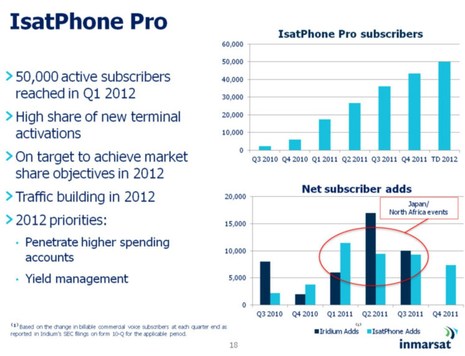
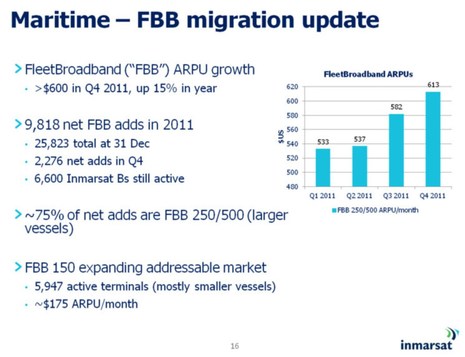
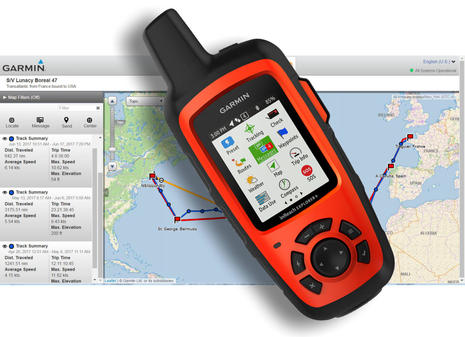
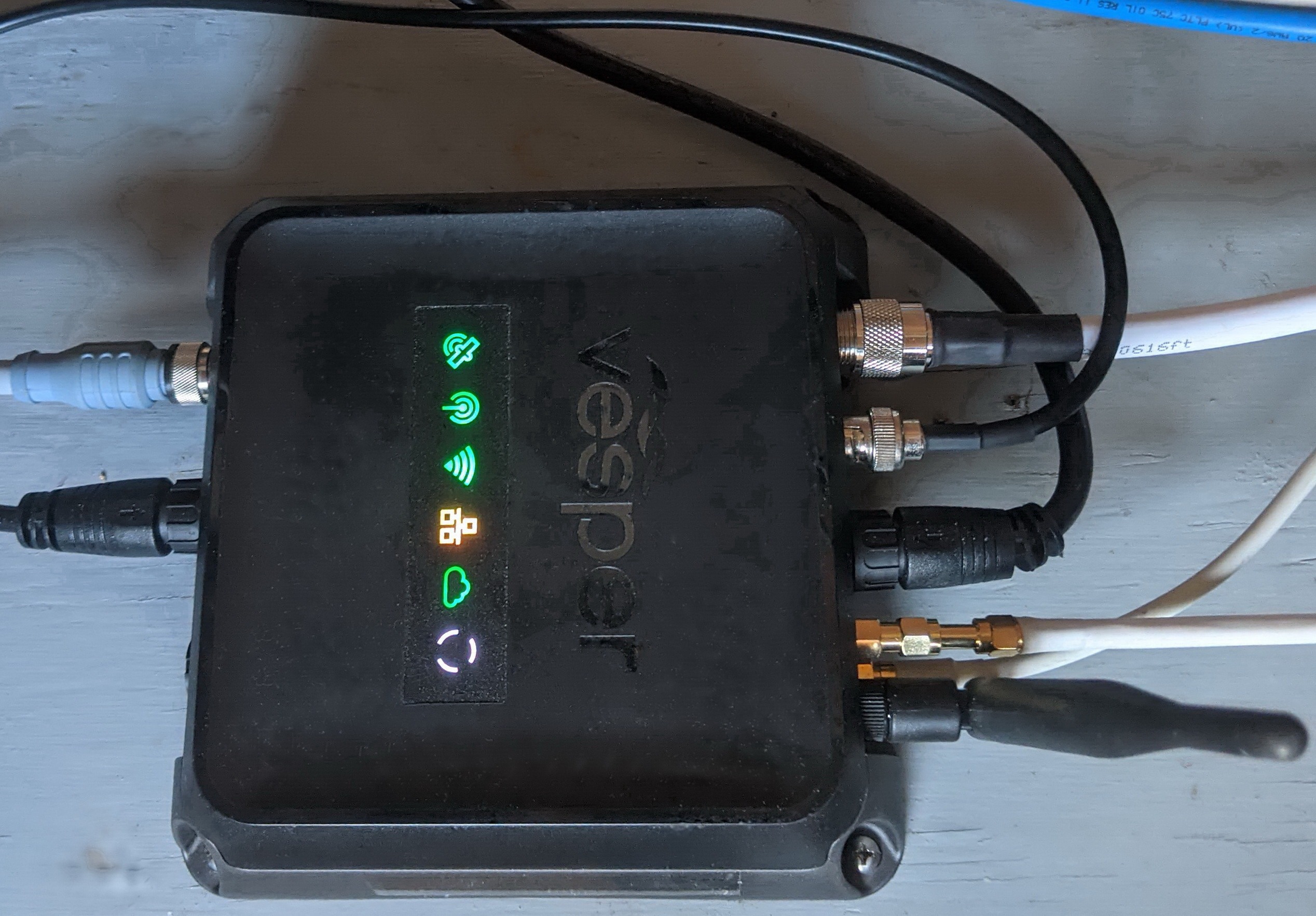
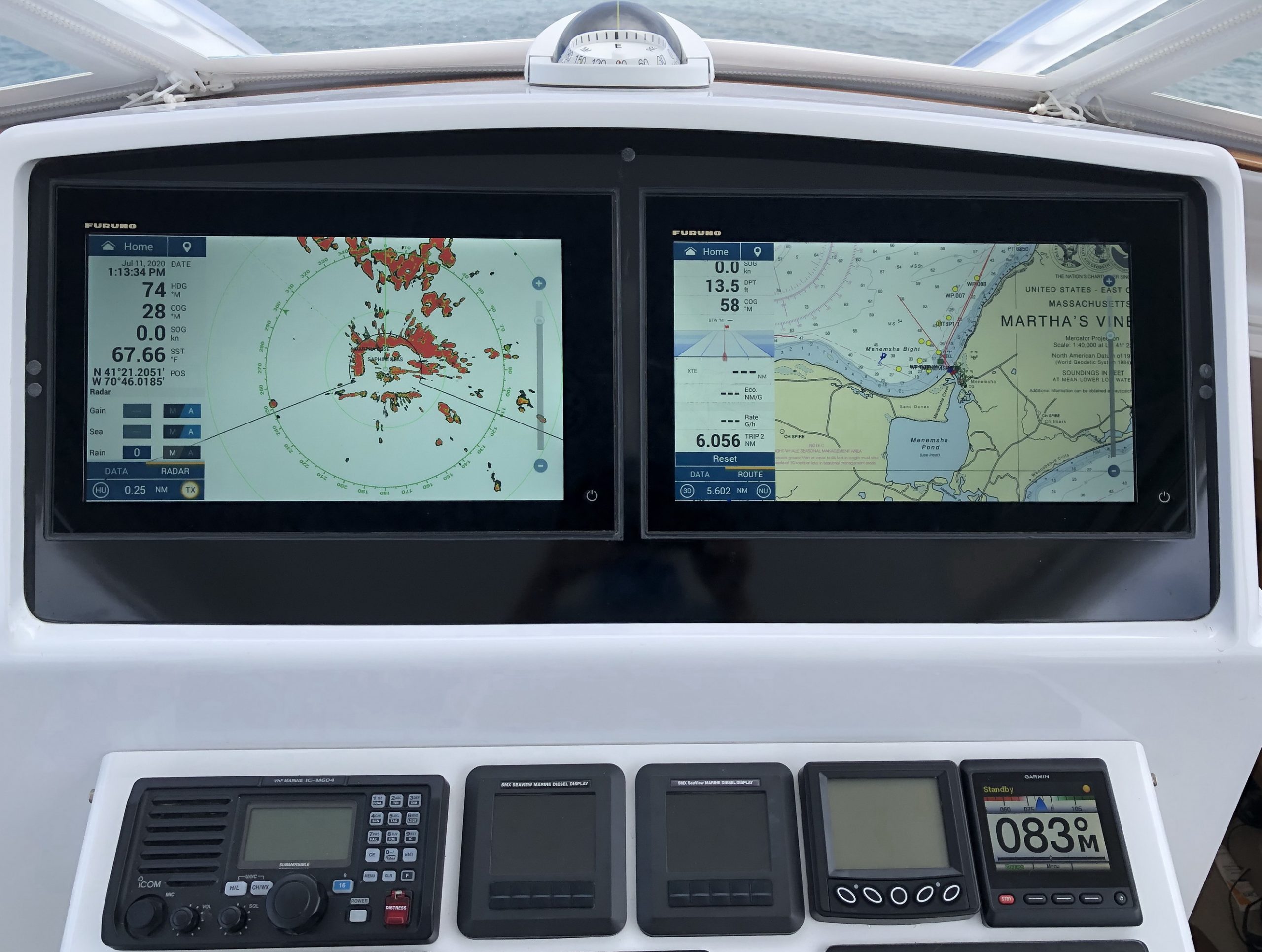








Hi Ben,
Great article – yes the pricing in the industry is very complex. The one takeaway regardless of which solution you choose is that some sort of satellite network manager is required to provide compression, firewall, and perhaps failover service. We’ve seen a lot of activity since launching our new range of routers and services for VSAT, FBB and OpenPort devices at http://www.redportglobal.com.
By the way, in the narrowband space, we wrote a short blog post comparing data pricing between Iridium and IsatPhone here: http://web.globalmarinenet.com/blog/bid/111695/IsatPhone-or-Iridium-Cheaper-for-Gribs-at-Sea-with-Mac-iOS
Hope you find it useful.
And people ask me why I bought an ICOM M-802.
A satphone would be great to take into the life raft (better have a GPS or an EPIRB/GPS as well, of course), and I would, favouring the belt-and-suspenders approach, appreciate a way to grab GRIB files when SSB propagation is sub-par.
But most e-mails could wait, really. And if I’m already coastal, a lot of places still have “radio-telephone” capacities.
So price is indeed a factor. A small cruising boat is qualitatively as well as quantitatively different from even a modest oceanic fishing boat or small cruise ship.
So until they come up with a plan that is as flexible as cell phone rates (low-use customers pay low flat rates with low limits, and high fees for exceeding those limits), this is a bad business model.
In land-based freight, you pay weight times distance. Distance is essentially obviated thanks to satellite, so “weight” (which is time multiplied by bits, by analogy) is the only fair way to go.
If someone can explain to me how I am failing to appreciate the big picture, I will listen. But at the moment, to hell with satphones, unless I just have one to hit “911” for free. Nine-one-one is still free, right?
Thanks, John. That blog entry is just the sort of hand’s on comparative analysis that some sailors are craving.
But isn’t it true that some hardware and/or sat service providers are including compression and even firewall protection in their offerings. I’m thinking of the Iridium products that apparently now include GMN service, but there may be others. I bet a lot of boaters like the idea of getting everything they need in one package, and, besides, all the parts need to be factored into purchase decisions.
Can you please explain what products have GMN compression built in, John. And anyone with knowledge of other compression and firewall products, please don’t hesitate to speak up. As mentioned in the earlier entry about RedPort routers ( http://goo.gl/skxY0 ), even broadband satellite connections need protection against unwanted data flow, maybe even more so.
Ok, so I have an irridium phone that cost me about what an inmarsat phone runs. I buy a prepaid card for it with 75 minutes of calling time that lasts 2 years for ~$150. I can roll those minutes if I renew the card.
Why would I even consider inmarsat? Why would anyone who only wants an emergency sat phone with minimal minutes?
Iridium, btw, has far superior sat service and with no internal gps you can acquire a sat very quickly. With inmarsat, you can wait minutes for a connection.
I’m failing to understand the motivation to raising prices.
Hey Rupert,
Your missing the point and also a pent-up market by implementing such a brazen price increase and by using complex product acronyms. I think your making your business way more complicated then it needs to be. There are thousands of sailors willing to buy sat phones if you would just offer a block of minutes that never expires and a simple phone. Just call it the “Princess” – Make it pink and I guarantee it will sell so fast it will make your head spin. My point is to encourage you to think along the lines of what this untouched market of boaters wants. Meet that need and you open a floodgate of business. With Afghanistan as your headwind we can be your tailwind.
In the mean time, while I wait for one of the sat phone companies to figure this out, I have my Icom SSB radio and can communicate worldwide for free.
In reference to the iridium vs Isatphone grib downloads, I’m seeing 22K grib files download in well under 2 minutes using UUPlus on the Isatphone. I haven’t yet, but saildocs grib service advertises a subscription option that will send one file each day, eliminating the need to make a email request everyday.
I joined the satcom fray in 1990 as a government program manager and was part of the problem until about 2005. Supply and demand aren’t really operative concepts in this industry. It started as a pure monopsony-monopoly partnership and has struggled with that heritage for well on a half century now.
The capital costs in this industry are perhaps as high as the energy and pharma industries without the customer base. When Iridium and Teledesic, inter alia, came along we had some hope for breaking out of the government sponsored utility model but the Iridium and Teledesic models required several miracles to be economically viable without the infusion of government funds and the confusion that brings to pricing. Both depended on the internet bubble funded user and an order of magnitude drop in launch costs (both part of the universally embraced fiction of the time).
Satcoms need war (or at least high tempo military ops) and/or a red hot international economy to fund the capital costs so marginal users can see pricing that makes economic sense given alternatives. It is no surprise people are doing systems mix and match to get their operating costs in under control.
Should the satcom industry decide to price people out of this essentially inelastic market, it will be more of the same thinking that has made this an industry of perpetually unmet promise (albeit one with amazing successes). Holding a price gun to a customer’s head frequently results in a back-fire and this industry has beaucoup powder burns.
We got the isatphone pro for use on the boat and at the cabin where there is no service, however if Inmarsat unilaterally decides that the $120.00 per month we pay for our modest 60 min/month services is just not enough and jacks up my bill, I will just exercise my upgrade to an iridium phone from my provider. It will hit me close to $600 with trade in but my contract will be up in June. I hate the bait and switch trend with telecoms nowadays. What a crock.
Great work Ben, Panbo is one of my daily pleasures! Thanks!
Another sign of big stakes and dynamic relationships in the satcom sector: Cobham (owner of Seatel, ACR, and many other brands) offered 425 million for Thrane & Thrane but were turned away. http://goo.gl/EBkEI
I suspect that Inmarsat have found themselves with part of their customer base that simply generates too low a average spend, yet ties up technical resources that deny bandwidth to higher paying users.
What killed satcom was the near universal and fast adoption of worldwide GSM. They had a market plan in the 80s that did not foresee the rapid uptake of mobile phones often in countries that had poor fixed line infrastructure. It has never really recovered from that mis-calculation.
Dave, how would using, say, 5 MB of data a month deny bandwidth to Inmarsat customers using much, much more? The tricky issue I tried to describe was how VSAT competitors are using low-price FleetBroadband plans to backup their systems in remote areas and heavy weather. And to some degree Inmarsat is still offering affordable low-volume plans to non-VSAT leisure and fishing vessels.
And where the heck did you get the idea that satcoms is dead? Inmarsat, Iridium, and Globalstar are spending billions on new systems, and those are only the ones I’ve heard about.
Can anyone clarify the present situation with respect to Inmarsat Fleet Broadband pricing?
It seems that a price increase might be coming for FBB, but we are not sure.
I have been told that it is likely that the ~50/month plan will be scrapped. If I understand correctly, this plan didn’t require paying for all 12 months of the year, as long as one was willing to pay a $50 fee to restart the service. Is this basically correct?
I have also heard that the per MB pricing for data will probably increase dramatically. Is this what people are hearing?
Is there any date by which all this will be settled?
Jeff, I think your best bet is to download the FBB pricing from this Stratos page:
http://www.stratosglobal.com/Support/Billing_Notices.aspx
On page 3 you’ll see the special Fisheries and Leisure plans that I mentioned above. What I don’t know is how these plans will look when sold by Stratos service providers. But I think we’ll know soon as the effective date for those FBB rates seems to be April 1. Note that while an
Ben all the LEO systems are in effect almost commercially defunct. Iridium couldn’t survive without in effect a huge US subsidy. Global star is struggling to justify replacement birds. The only one thriving is Inmarsat and that originally got a huge leg up from governments and bring integrated into GMDSS. Several other leo system never even got off the ground. ( remember Teledesic) .
Satcomms has proven a very difficult market in which to make money. Perhaps in the future with the interwebby being more and more important at sea, well see dedicated data based satcomms. I hope so
I see the first complaints over on CruiserForum. people isatphone prices plans going from 14.95 a month to 39.95 a month. (and he cancelled). http://goo.gl/Y8kv5
Dave
Let’s be careful about hearsay. The SatPhoneStore, for instance, is still offering remarkably inexpensive iSatphone Pro hardware and service, including $15/mo year-long contracts and prepaid cards good for two years (though still only usable 15 miles outside U.S. coast): http://goo.gl/bA6Eo
Note that they are throwing in an interesting gadget called the SatStation miniBlu, which let’s you put the Inmarsat phone in a good reception spot on deck and run it via Bluetooth. http://goo.gl/nQbhd
Good news for IsatPhonePro and other Inmarsat users: Today the company announced that pre-paid cards for voice calls will be available for use in U.S. waters starting on Sept. 1. The press release begins thusly:
“LONDON – 21 August 2012 – Inmarsat (LSE:ISAT.L), the leading provider of global mobile satellite communications services, today announced that it now offers global pre-paid satellite services for both voice and data via the Inmarsat pre-pay platform with the introduction of support for voice calls originating in the US and its territories.
Through an agreement with Freedom Wireless Holdings Inc., Inmarsat is now the first mobile satellite provider in the world licensed to offer pre-paid voice services from the US. Pre-pay voice will be available from 1st September 2012 for all existing Inmarsat land and maritime services including IsatPhone Pro, BGAN, FleetBroadband and FleetPhone.”
There’s nothing I can find about card pricing and date ranges yet.
Is Freedom Wireless Holdings Inc. a real company? The parent company has three employees and a market cap of $156,000?
http://investing.businessweek.com/research/stocks/snapshot/snapshot.asp?ticker=TMTP